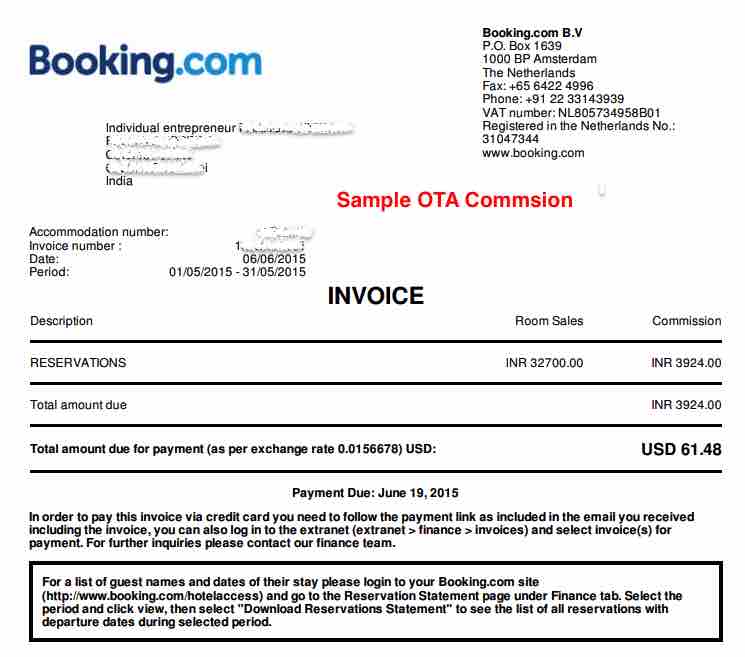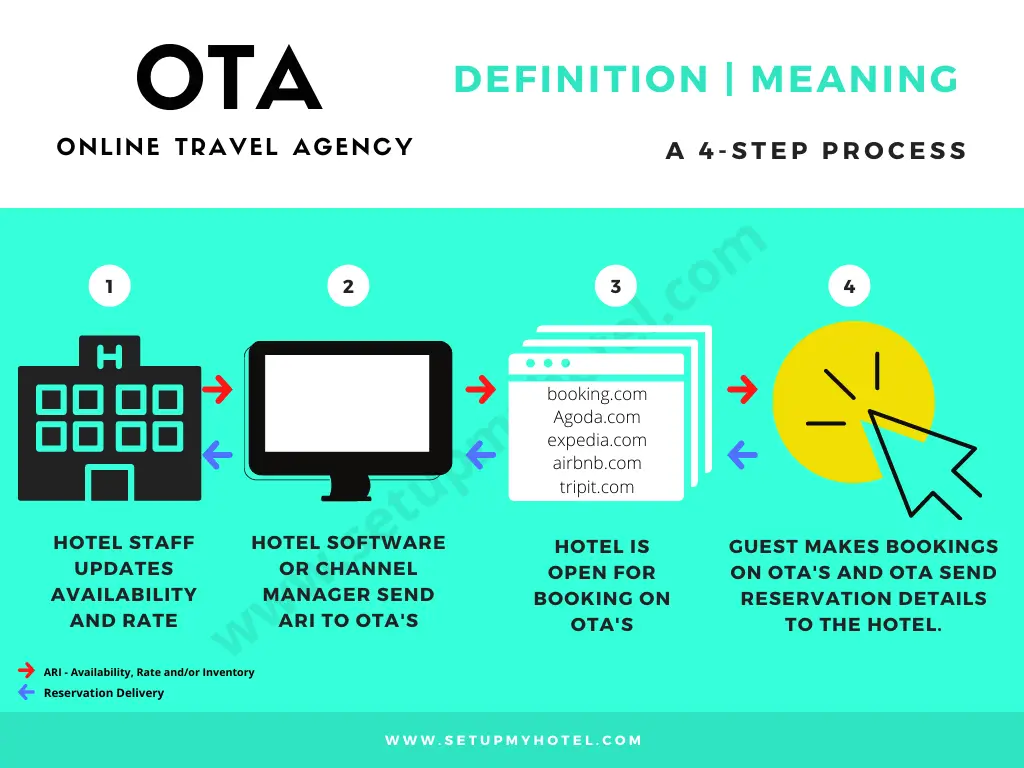What is the Definition or Meaning of OTA and its relevance to the Hospitality Industry?
OTAs stand for Online Travel Agencies or Online Travel AgentsOTA � Online Travel Agency What is the meaning/definition of OTA; in the hospitality industry? OTA.... In general Online Travel Agents are third-party internet / online bookings or reselling sites that primarily sell hotel rooms, tours, flight tickets, car rentals, vacations, cruises, local experiences, etc.
They cover virtually every aspect of researching, planning, and booking travel, from choosing the best airplane seat to reading personal travel reviews of hotels to planning what to do in a destination once you arrive.
As the use of the internet has increased many times over the years a large number of consumer-oriented systems like OTA have become available right on the guest’s mobile or any devices that have access to the internet.
Synonyms for OTA are IDS – Internet Distribution Systems, Online Booking Channel, Online Channels, and ADS – Alternative Distribution Systems.
Examples of Major OTAs – Online Travel Agency are:
- Expedia Group – Expedia.com, Hotels.com, Vrbo.com, HomeAway.com, Orbitz.com, Travelocity, ExpediaCruises etc.
- Priceline Group – booking.com, agoda.com, priceline.com, kayak.com, RentalCars.com, Opentable.com
- Airbnb – Airbnb Rentals, Airbnb Experiences.
- TripAdvisor – TripAdvisor.com, flipkey.com
- MakeMyTrip – MakemyTrip.com
- ClearTrip – Cleartrip.com
- Hostel World – Hostelworld.com
- Late Rooms – LateRooms.com
- Last Minute – Lastminute.com
- Ctrip – Trip.com
- Skyscanner – Skyscanner.com
- Kiwi – Kiwi.com
- Hotwire – Hotwire.com
Advantages and Disadvantages of using OTAs in Hotels:
OTA’s are like two-edged swords for hotels. On one side, they offer exposure and provide more bookings but on the other hand, these third-party booking websites offer much lower rates than the hotel’s website.
How does OTA’s Make Money?
The OTA’s charges the hotel commission for each booking which is generated from their website. These commission rates may vary per each OTA. For example, expedia.com may charge a commission between 15% to 30% per booking, whereas booking.com charges from 10% to 20% for each booking.
Also, the geography of the hotel where it is located plays an important role in these commission charges by the OTAs. For example, hotels that are located in the city may attract a higher commission percentage than those located in the outer city or remote areas.
OTA Commission Payment Procedure For Hotels:
Pre-Paid OTA CommissionThe amount payable to bookers like travel agents; online travel agents (booking.com; Expedia; GDS); ... – Some OTA’s collect the full rental or booking amount in advance from the guest at the time of generating the online booking, and then the payment after deducting the commission is later credited to the hotel’s bank account.
Post-Paid OTA Commission – In this case, the commission statement is sent to the hotel after each month-end for payment. This commission statement or invoice will consist of the guest details who had booked from their respective OTA.
Sample OTA’s Monthly Commission Statement:

How do hotels connect or manage their inventory on OTAs?
Method 1: Login and manage inventory directly on each OTA portal.
There are many OTAs and each of them has its portal to manage inventory and rates. It is indeed a tedious and time-consuming job to manage your hotel’s inventory on all these OTAs.
Method 2: Use HotelA Hotel or Inn may be defined as an establishment whose primary business is providing lodging facili... Management Software with an OTA connection.
Nowadays with the help of new-age hotel management software / PMS – Property Management SystemThey are computerised systems that facilitate the management of properties; personal property; equip... hotels can also automatically update your hotel’s availability in real-time on all sites when a booking is made when you close a room to sale, or when you want to make bulk changes to your inventory.
Method 3: Use a third-party Channel ManagerManager is a person in the hotel operations who is assigned to manage or supervise a group of employ...
To ease the job of hotel revenue staff/managers there is third-party software called ‘Channel Manager’, which will allow them to sell all their rooms on all connected OTA sites, GDS Channels, Wholesalers, Hotel’s website, etc. at the same time.
How hotel details are pushed/pulled by OTA’s?
Hotels send their ARI – Availability, Rate, and/or InventoryDefinition of Inventory in Hotel Operation? Inventory is the stocks of merchandise; operating suppli... to the connected OTA’s, this is done with the help of a hotel management software or a channel manager.
The ARI is sent in a standard XML format, below you can see a sample XML document.












